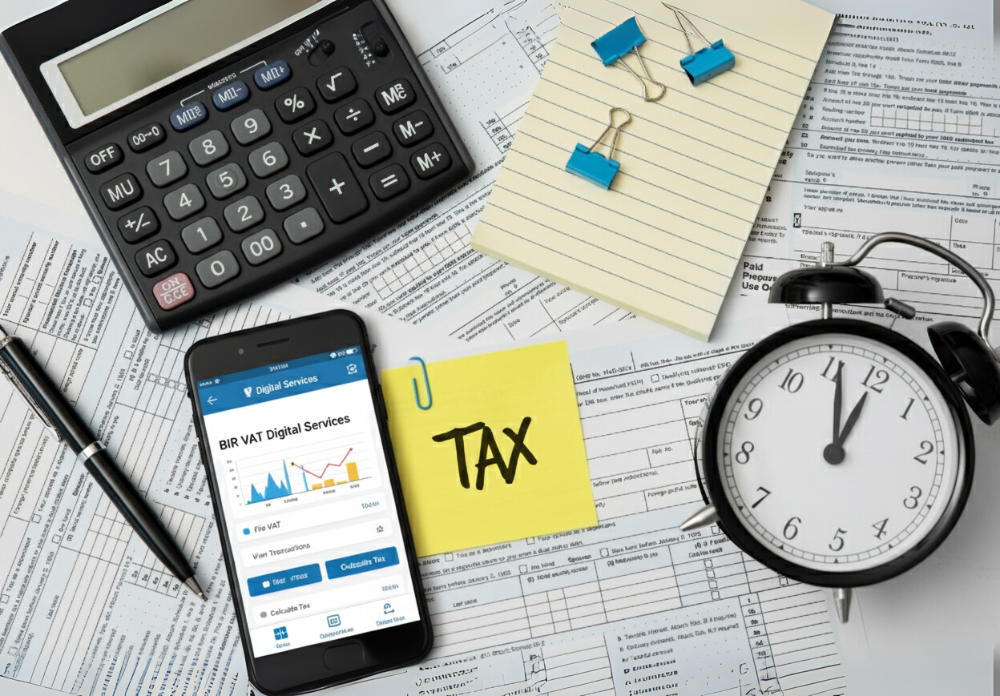Withholding taxes play a vital role in the Philippine tax system, serving as a mechanism for the government to collect income tax at the source. This system requires taxpayers—whether businesses, employers, or other entities—to act as withholding agents, deducting taxes from payments made to employees, suppliers, or contractors and remitting them directly to the Bureau of Internal Revenue (BIR).
While this system simplifies tax collection for the government, it presents unique challenges for businesses and individuals who must navigate complex rules, rates, and filing requirements. From withholding tax types like Expanded Withholding Tax (EWT) and Final Withholding Tax (FWT) to the process of filing and remitting taxes through tools like the BIR’s Electronic Filing and Payment System (eFPS), compliance is a critical part of avoiding penalties and maintaining a clean financial record.
In this guide, we’ll break down everything you need to know about withholding taxes in the Philippines, including their purpose, common types, filing requirements, and the consequences of non-compliance. Whether you’re a business owner, HR professional, or self-employed individual, understanding these processes will help you stay compliant and efficient in meeting your tax obligations.
What is Withholding Tax?
Withholding tax refers to the portion of income tax that a withholding agent deducts and remits to the BIR on behalf of a taxpayer. Instead of waiting until the end of a taxable year, this system ensures that taxes on certain income payments are collected progressively throughout the year.
In the Philippines, withholding taxes serve two key purposes:
- Efficient Tax Collection: By requiring withholding agents to deduct taxes at the source, the government ensures steady tax collection, reducing the risk of non-compliance by taxpayers.
- Taxpayer Convenience: It simplifies the process for taxpayers, who no longer need to pay their entire tax due at once since portions are deducted regularly from income payments.
Legal Basis Under the Philippine Tax Code
The legal framework for withholding taxes in the Philippines is established under the National Internal Revenue Code (NIRC), also known as the Philippine Tax Code. This law mandates the imposition of withholding taxes on specific income payments and designates withholding agents responsible for compliance.
Under this system, income payments subjected to withholding include professional fees, royalties, dividends, and compensation. The types of withholding taxes in the Philippines include:
- Final Withholding Tax: Constitutes the full and final payment of the income tax due on certain income payments, such as dividends and royalties.
- Expanded Withholding Tax (EWT): Creditably withheld tax that is offset against the taxpayer’s annual income tax liabilities.
The rates of taxes withheld depend on the nature of income payments and whether the recipient is a resident, non-resident, or corporation in the Philippines. For non-resident aliens not engaged in trade or business, tax on income derived from Philippine sources is generally subject to a final withholding tax rate of 25%.
Types of Withholding Taxes
1. Expanded Withholding Tax (EWT)
The Expanded Withholding Tax is a creditable withholding tax applied to income payments and is creditable against the income tax due from the payee. Businesses and top withholding agents are required to withhold a portion of payments made to suppliers, contractors, or professionals for services rendered or goods provided.
Key Features:
- Tax Prescribed on Certain Income: Includes professional fees, commissions, and rental payments.
- Tax Treatment: Amounts withheld are creditable against the income tax liability of the payee.
- Tax Rates: Vary depending on the income type and activity, as defined by BIR tax laws.
For instance, fees paid to consultants engaged in the practice of their profession shall be subject to EWT at specific rates.
Filing and Documentation:
- Submit BIR Form 2307 to document withheld amounts.
- Payments derived from sources within the Philippines fall under this category.
2. Withholding Tax on Compensation
This tax is imposed on employee salaries and wages, ensuring that income taxes are remitted directly to the BIR by employers. It includes regular pay, bonuses, and other monetary benefits like those from trust funds and similar arrangements.
Key Features:
- Tax Prescribed: Calculated based on the employee’s income subjected to final tax.
- Employees earning below the tax exemption threshold or exempt from income tax are not required to pay.
- Income Tax Rate: Progressive, depending on salary brackets outlined in the BIR tax information.
Employers must act as withholding agents, deducting and remitting the appropriate amounts on time.
3. Final Withholding Tax
Final Withholding Tax is a one-time tax applied to specific income payments. It ensures the tax due from the payee is fully settled at the time of payment. This tax is not creditable against the income tax but serves as a final settlement.
Examples of Payments Subject to Final Withholding Tax:
- Payments to Non-Resident Foreign Corporations: Income derived from activities in the Philippines by foreign entities.
- Tax on Gross Income Payments: Such as dividends, royalties, and interest.
- Disposition of Shares of Stock: Gains from the sale of shares in a domestic corporation traded in the stock exchange.
Tax rates for these payments vary depending on the nature of the income and applicable tax treaties.
4. Percentage Taxes
For non-VAT registered businesses, percentage taxes serve as an alternative to the value-added tax (VAT). These apply to gross receipts from sales and services.
Key Features:
- Applicable to businesses not exceeding the VAT threshold.
- Includes real properties, sales of goods, and services rendered.
- The tax amount is based on the gross sales or receipts, typically at 1% to 3%.
Percentage taxes are filed regularly using forms prescribed by the BIR website.
Who Needs to Withhold Taxes in the Philippines?
1. Businesses and Employers
Businesses and employers in the Philippines are often designated as withholding agents by the BIR. Their responsibility is to deduct and remit a specific amount of tax from income payments to suppliers, employees, and other payees. This ensures that taxes on income are pre-paid to the government.
- Corporate Income Tax and Payroll Obligations: Employers must deduct withholding taxes on compensation and other benefits given to employees. This includes mandatory deductions for final withholding VAT where applicable.
- Tax on Income Payments to Suppliers: Businesses engaged in the sale of goods and services must withhold taxes on payments made to registered suppliers or contractors, as prescribed by the BIR.
Example: An employer pays a professional fee to a consultant. Under the BIR rules, the employer must compute the tax amount based on the applicable rate, deduct it from the payment, and remit it to the BIR.
2. Self-Employed Individuals
Self-employed individuals, such as freelancers and sole proprietors, are also subjected to withholding tax obligations if they employ workers or contract services. While they are taxpayers themselves, they may act as withholding agents when paying contractors, ensuring that applicable taxes are deducted and remitted.

Living and Doing Business in the Philippines
The Philippines is fast becoming a top destination for businesses seeking growth and a high quality of life. With its strategic location in Southeast Asia, a young, skilled workforce, and strong English proficiency, it’s an ideal place for entrepreneurs and companies to expand.
Distinctions Between Local and Foreign Entities
Local Entities
Philippine corporations, partnerships, and individuals registered with the BIR are required to comply with the withholding tax system. Income payments, whether for goods, services, or employee compensation, are subject to withholding tax, with rates depending on the transaction type.
- Withholding Tax Types: Local entities deal with multiple tax types, including Expanded Withholding Tax (EWT) for professional fees and rentals, and withholding on employee compensation.
- Tax on Monetary Benefit from Deposit Substitutes: Local banks, for instance, are responsible for withholding taxes on monetary benefits from deposit substitutes and from trust funds.
Foreign Entities
Foreign corporations and individuals operating or earning in the Philippines are also subject to income tax under Philippine law. The BIR mandates withholding on payments to non-residents, such as royalties, dividends, or services rendered in the country.
- Expanded Foreign Currency Deposit System: Foreign corporations engaged in the expanded foreign currency deposit system in the Philippines are required to withhold and remit taxes as part of their obligations.
- Net Capital Gains Realized: Non-residents earning net capital gains realized from the sale of stocks in a domestic corporation are also subject to withholding taxes.
Special Note: Payments to foreign entities may be subject to tax treaties, which could lower the applicable tax rates under specific conditions.
Withholding Tax Rates and Computation
1. For Freelancers
Scenario: A company pays a registered Filipino freelancer PHP 50,000 for services rendered.
- Applicable Rate: 10% (professional fees under EWT).
- Computation: PHP 50,000 × 10% = PHP 5,000 withheld.
- The freelancer receives PHP 45,000 net, and the company remits PHP 5,000 to the BIR.
2. For Payroll (Withholding Tax on Compensation)
Scenario: An employee earning PHP 30,000 per month is subject to withholding based on the graduated income tax rates.
- Applicable Rate: Based on the BIR tax table (e.g., 20% for taxable income exceeding PHP 20,833).
- Computation:
- Taxable income: PHP 30,000 – PHP 20,833 (non-taxable portion) = PHP 9,167.
- Tax: PHP 9,167 × 20% = PHP 1,833.
- The employer withholds PHP 1,833, and the employee receives PHP 28,167 net.
3. For Suppliers
Scenario: A company rents an office space for PHP 100,000 per month.
- Applicable Rate: 5% (rental payments under EWT).
- Computation: PHP 100,000 × 5% = PHP 5,000 withheld.
- The landlord receives PHP 95,000 net, and the company remits PHP 5,000 to the BIR.
Deadlines and Schedules for Withholding Tax Filings
Monthly Filings
- Expanded Withholding Tax (EWT):
- Use BIR Form 1601-E.
- Due on or before the 10th day of the following month for manual filers.
- For eFPS users, the deadline depends on the assigned staggered schedule.
- Withholding Tax on Compensation:
- Use BIR Form 1601-C.
- Due on or before the 10th day of the following month for manual filers.
Quarterly Filings
- Quarterly Remittance Return:
- Use BIR Form 1601-EQ for expanded withholding tax and BIR Form 1601-FQ for final withholding tax.
- Due on or before the last day of the month following the quarter’s end.
Annual Filings
- Annual Information Return:
- Use BIR Form 1604-CF for compensation and BIR Form 1604-E for expanded withholding tax.
- Due on or before January 31 of the following year for compensation-related taxes and March 1 for expanded withholding tax.
Tools and Forms for Submission
To facilitate compliance, the BIR requires the use of specific forms depending on the type of withholding tax:
Common Forms:
- BIR Form 1601-E: For monthly remittance of expanded withholding tax.
- BIR Form 1601-C: For monthly remittance of withholding tax on compensation.
- BIR Form 2307: Certificate of Creditable Tax Withheld at Source, provided to suppliers or contractors.
- BIR Form 2306: Certificate of Final Tax Withheld at Source.
Ensure these forms are accurately filled out and submitted on time to avoid surcharges and penalties.
Filing Through the Electronic Filing and Payment System (eFPS)
The Electronic Filing and Payment System (eFPS) is a digital platform by the BIR that simplifies the filing and payment process. Here’s how to file electronically:
Step 1: Register for eFPS
- Businesses must register with the BIR eFPS. Ensure your business is properly registered with the Philippine tax system and linked to an authorized bank for payments.
Step 2: Prepare Your Returns
- Log in to the eFPS portal and select the appropriate withholding tax return form (e.g., 1601-E or 1601-C).
- Fill out the form accurately, ensuring the amounts withheld match your financial records.
Step 3: Submit and Pay
- After completing the form, submit it through the portal.
- Payments can be made via your depository bank under the expanded foreign payment system or other authorized payment channels.
Step 4: Keep Records
- Retain digital and hard copies of your filed returns and payment confirmation for future reference.
Starting January 2024, compliance will require stricter adherence to eFPS filing for all large taxpayers and businesses.
Consequences of Non-Compliance with Withholding Taxes in the Philippines
The BIR imposes strict penalties to ensure that taxpayers and withholding agents meet their obligations accurately and on time.
Types of Penalties
- Surcharge: A 25% surcharge on the amount due is imposed for the following:
Failure to file returns or pay taxes on time.
Incorrect filing due to willful neglect or fraud. - Interest: An annual interest of 20% is charged on the unpaid amount, calculated from the deadline until the tax is fully paid.
- Compromise Penalty: Additional penalties, called compromise penalties, may apply based on the discretion of the BIR, depending on the gravity of the non-compliance.
Example of Penalty Computation
Scenario: A company fails to remit PHP 50,000 in withholding tax prescribed on certain transactions by the due date.
- Surcharge: PHP 50,000 × 25% = PHP 12,500.
- Interest: PHP 50,000 × 20% = PHP 10,000 per year (or PHP 833.33 per month).
- Total Penalty: PHP 62,500 plus monthly interest accrual.
Risks of Non-Compliance
Beyond financial penalties, non-compliance exposes businesses to significant risks that can disrupt operations and damage their reputation.
1. Audits and Investigations
Non-compliance often triggers BIR audits, which can lead to:
- Time-consuming reviews of financial records.
- Additional assessments and legal fees.
- Greater scrutiny on future filings and transactions.
2. Reputational Damage
Being flagged for non-compliance undermines trust with:
- Business partners who may question your financial reliability.
- Employees, if compensation-related tax obligations are neglected.
- Stakeholders and investors concerned about regulatory risks.
3. Legal Consequences
For serious violations, such as deliberate tax evasion or failure to remit taxes withheld, the BIR may pursue legal action, which can result in:
- Hefty fines.
- Criminal charges against responsible officers.
- Suspension of business permits or operations.
How to Avoid Non-Compliance
- Track Deadlines: Maintain a calendar for monthly, quarterly, and annual filing schedules.
- Use the Right Tools: Utilize BIR-approved forms and platforms like the eFPS to ensure accuracy and timeliness.
- Engage Professionals: Seek assistance from tax advisors or outsourcing firms to reduce errors.
The Role of Technology
Tools like payroll software and accounting systems can help automate withholding tax types calculations, ensuring precise computations and timely filings.
Avoid the risks of non-compliance by entrusting your tax obligations to the experts. At iScale Solutions, we specialize in withholding taxes, payroll management, and other financial services, ensuring your business stays compliant with Philippine regulations.
Reach out to us today to learn how we can help your business remain penalty-free and focused on growth.


